1991 考研英语真题及答案
Section I
Structure and Vocabulary
In each sentence, decide which of the four choices given will suitably complete
the sentence if inserted at the place marked. Put your choice in the ANSWER SHEET.
(15 points)
1.
They lost their way in the forest, and ________ made matters worse was that
night began to fall.
[A] that
[B] it
[C] what
[D] which
2.
________ my return, I learned that Professor Smith had been at the Museum and
would not be back for several hours.
[A] At
[B] On
[C] With
[D] During
3.
Anyone who has spent time with children is aware of the difference in the way
boys and girls respond to ________ situations.
[A] similar
[B] alike
[C] same
[D] likely
4.
There is not much time left; so I’ll tell you about it ________.
[A] in detail
[B] in brief
[C] in short
[D] in all
5.
In this factory, suggestions often have to wait for months before they are fully
________.
[A] admitted
[B] acknowledged
�
[C] absorbed
[D] considered
6.
There is a real possibility that these animals could be frightened, ________
a sudden loud noise.
[A] being there
[B] should there be
[C] there was
[D] there having been
7.
By the year 2000, scientists probably ________ a cure for cancer.
[A] will be discovering
[B] are discovering
[C] will have discovered
[D] have discovered
8.
Jim isn’t ________, but he did badly in the final exams last semester.
[A] gloomy
[B] dull
[C] awkward
[D] tedious
9.
The boy slipped out of the room and headed for the swimming pool without his
parents’ ________.
[A] command
[B] conviction
[C] consent
[D] compromise
10. He had ________ on the subject.
[A] a rather strong opinion
[B] rather strong opinion
[C] rather the strong opinion
[D] the rather strong opinion
11. When Jane fell off the bike, the other children ________.
[A] were not able to help laughter
[B] could not help but laughing
�
[C] could not help laughing
[D] could not help to laugh
12. It is better to die on one’s feet than ________.
[A] living on one’s knees
[B] live on one’s knees
[C] on one’s knees
[D] to live on one’s knees
13. The most important ________ of his speech was that we should all work
wholeheartedly for the people.
[A] element
[B] spot
[C] sense
[D] point
14. This watch is ________ to all the other watches on the market.
[A] superior
[B] advantageous
[C] super
[D] beneficial
15. In a typhoon, winds ________ a speed greater than 120 kilometers per hour.
[A] assume
[B] accomplish
[C] attain
[D] assemble
16. ________ the English examination I would have gone to the concert last Sunday.
[A] In spite of
[B] But for
[C] Because of
[D] As for
17. Mary ________ my letter; otherwise she would have replied before now.
[A] has received
[B] ought to have received
[C] couldn’t have received
�
[D] shouldn’t have received
18. ________ to speak when the audience interrupted him.
[A] Hardly had he begun
[B] No sooner had he begun
[C] Not until he began
[D] Scarcely did he begin
19. Anna was reading a piece of science fiction, completely ________ to the outside
world.
[A] being lost
[B] having lost
[C] losing
[D] lost
20. The policemen went into action ________ they heard the alarm.
[A] promptly
[B] presently
[C] quickly
[D] directly
21. The lost car of the Lees was found ________ in the woods off the highway.
[A] vanished
[B] abandoned
[C] scattered
[D] rejected
22. Dress warmly, ________ you’ll catch cold.
[A] on the contrary
[B] or rather
[C] or else
[D] in no way
23. Our research has focused on a drug which is so ________ as to be able to change
brain chemistry.
[A] powerful
[B] influential
[C] monstrous
�
[D] vigorous
24. Bob was completely ________ by the robber’s disguise.
[A] taken away
[B] taken down
[C] taken to
[D] taken in
25. Difficulties and hardships have ________ the best qualities of the young
geologist.
[A] brought out
[B] brought about
[C] brought forth
[D] brought up
26. Our modern civilization must not be thought of as ________ in a short period
of time.
[A] being created
[B] to have been created
[C] having been created
[D] to be created
27. Even if they are on sale, these refrigerators are equal in price to, if not
more expensive than, ________ at the other store.
[A] anyone
[B] the others
[C] that
[D] the ones
28. The bank manager asked his assistant if it was possible for him to ________
the investment plan within a week.
[A] work out
[B] put out
[C] make out
[D] set out
29. He knows little of mathematics, and ________ of chemistry.
[A] even more
[B] still less
�
[C] no less
[D] still more
30. The students expected there ________ more reviewing classes before the final
exam.
[A] is
[B] being
[C] have been
[D] to be
Section II Reading Comprehension
Each of the passages below is followed by some questions. For each question four
answers are given. Read the passages carefully and choose the best answer to each
of the questions. Put your choice in the ANSWER SHEET. (30 points)
Text 1
A wise man once said that the only thing necessary for the triumph of evil is
for good men to do nothing. So, as a police officer, I have some urgent things to
say to good people.
Day after day my men and I struggle to hold back a tidal wave of crime. Something
has gone terribly wrong with our once-proud American way of life. It has happened
in the area of values. A key ingredient is disappearing, and I think I know what
it is: accountability.
Accountability isn’t hard to define. It means that every person is responsible
for his or her actions and liable for their consequences.
Of the many values that hold civilization together -- honesty, kindness, and
so on -- accountability may be the most important of all. Without it, there can
be no respect, no trust, no law -- and, ultimately, no society.
My job as a police officer is to impose accountability on people who refuse,
or have never learned, to impose it on themselves. But as every policeman knows,
external controls on people’s behavior are far less effective than internal
restraints such as guilt, shame and embarrassment.
Fortunately there are still communities -- smaller towns, usually -- where
schools maintain discipline and where parents hold up standards that proclaim: “In
this family certain things are not tolerated -- they simply are not done!”
Yet more and more, especially in our larger cities and suburbs, these inner
restraints are loosening. Your typical robber has none. He considers your property
his property; he takes what he wants, including your life if you enrage him.
The main cause of this break-down is a radical shift in attitudes. Thirty years
ago, if a crime was committed, society was considered the victim. Now, in a shocking
�
reversal, it’s the criminal who is considered victimized: by his underprivileged
upbringing, by the school that didn’t teach him to read, by the church that failed
to reach him with moral guidance, by the parents who didn’t provide a stable home.
I don’t believe it. Many others in equally disadvantaged circumstances choose
not to engage in criminal activities. If we free the criminal, even partly, from
accountability, we become a society of endless excuses where no one accepts
responsibility for anything.
We in America desperately need more people who believe that the person who
commits a crime is the one responsible for it.
31. What the wise man said suggests that ________.
[A] it’s unnecessary for good people to do anything in face of evil
[B] it’s certain that evil will prevail if good men do nothing about it
[C] it’s only natural for virtue to defeat evil
[D] it’s desirable for good men to keep away from evil
32. According to the author, if a person is found guilty of a crime, ________.
[A] society is to be held responsible
[B] modern civilization is responsible for it
[C] the criminal himself should bear the blame
[D] the standards of living should be improved
33. Compared with those in small towns, people in large cities have ________.
[A] less self-discipline
[B] better sense of discipline
[C] more mutual respect
[D] less effective government
34. The writer is sorry to have noticed that ________.
[A] people in large cities tend to excuse criminals
[B] people in small towns still stick to old discipline and standards
[C] today’s society lacks sympathy for people in difficulty
[D] people in disadvantaged circumstances are engaged in criminal activities
35. The key point of the passage is that ________.
[A] stricter discipline should be maintained in schools and families
[B] more good examples should be set for people to follow
[C] more restrictions should be imposed on people’s behavior
[D] more people should accept the value of accountability
�
Text 2
The period of adolescence, i.e., the period between childhood and adulthood,
may be long or short, depending on social expectations and on society’s definition
as to what constitutes maturity and adulthood. In primitive societies adolescence
is frequently a relatively short period of time, while in industrial societies with
patterns of prolonged education coupled with laws against child labor, the period
of adolescence is much longer and may include most of the second decade of one’
s life. Furthermore, the length of the adolescent period and the definition of
adulthood status may change in a given society as social and economic conditions
change. Examples of this type of change are the disappearance of the frontier in
the latter part of the nineteenth century in the United States, and more universally,
the industrialization of an agricultural society.
roles,
rights,
by
legal
of
status
privileges
definitions
In modern society, ceremonies for adolescence have lost their formal
recognition and symbolic significance and there no longer is agreement as to what
constitutes initiation ceremonies. Social ones have been replaced by a sequence
of steps that lead to increased recognition and social status. For example, grade
school graduation, high school graduation and college graduation constitute such
a sequence, and while each step implies certain behavioral changes and social
recognition, the significance of each depends on the socio-economic status and the
educational ambition of the individual. Ceremonies for adolescence have also been
replaced
and
responsibilities. It is during the nine years from the twelfth birthday to the
twenty-first that the protective and restrictive aspects of childhood and minor
status are removed and adult privileges and responsibilities are granted. The
twelve-year-old is no longer considered a child and has to pay full fare for train,
airplane, theater and movie tickets. Basically, the individual at this age loses
childhood privileges without gaining significant adult rights. At the age of
sixteen the adolescent is granted certain adult rights which increases his social
status by providing him with more freedom and choices. He now can obtain a driver’
s license; he can leave public schools; and he can work without the restrictions
of child labor laws. At the age of eighteen the law provides adult responsibilities
as well as rights; the young man can now be a soldier, but he also can marry without
parental permission. At the age of twenty-one the individual obtains his full legal
rights as an adult. He now can vote, he can buy liquor, he can enter into financial
contracts, and he is entitled to run for public office. No additional basic rights
are acquired as a function of age after majority status has been attained. None
of these legal provisions determine at what point adulthood has been reached but
they do point to the prolonged period of adolescence.
36. The period of adolescence is much longer in industrial societies because
________.
[A] the definition of maturity has changed
[B] the industrialized society is more developed
�
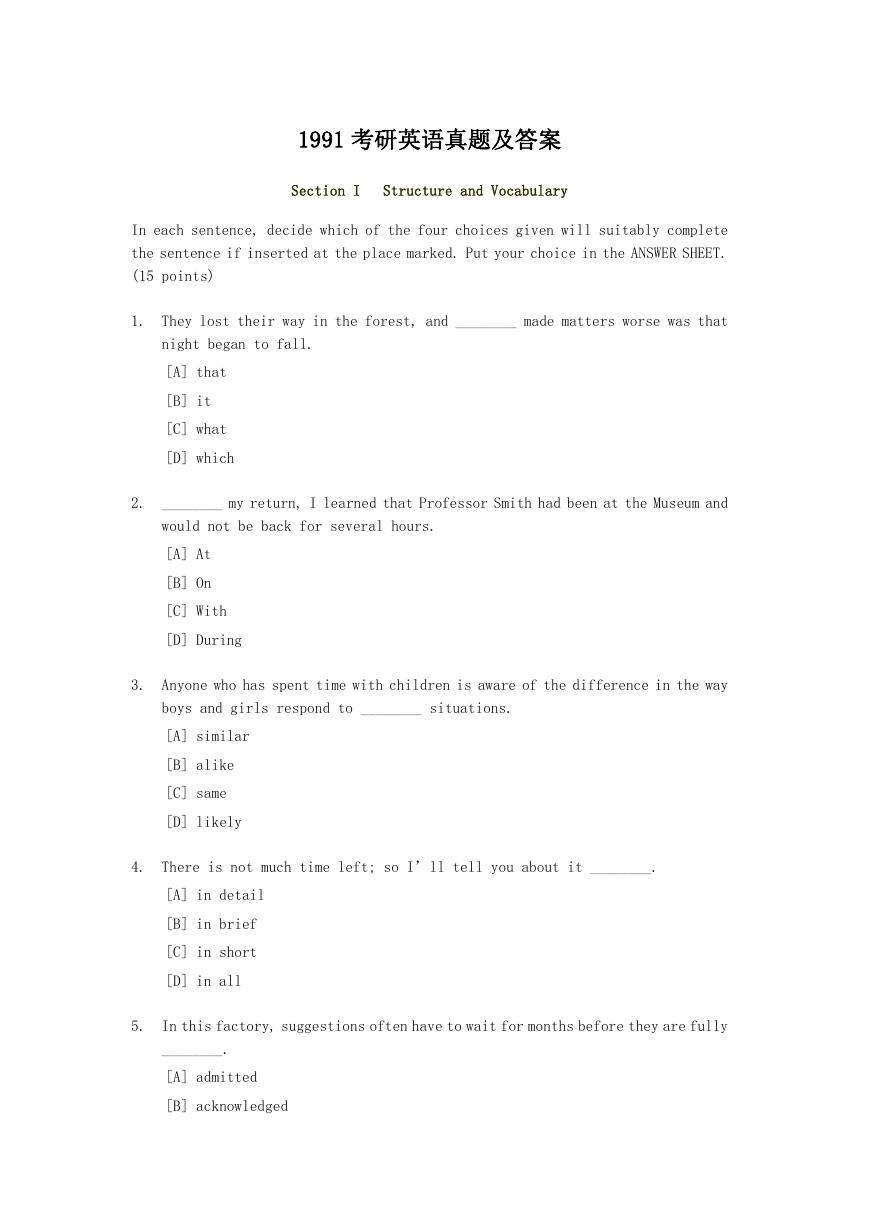

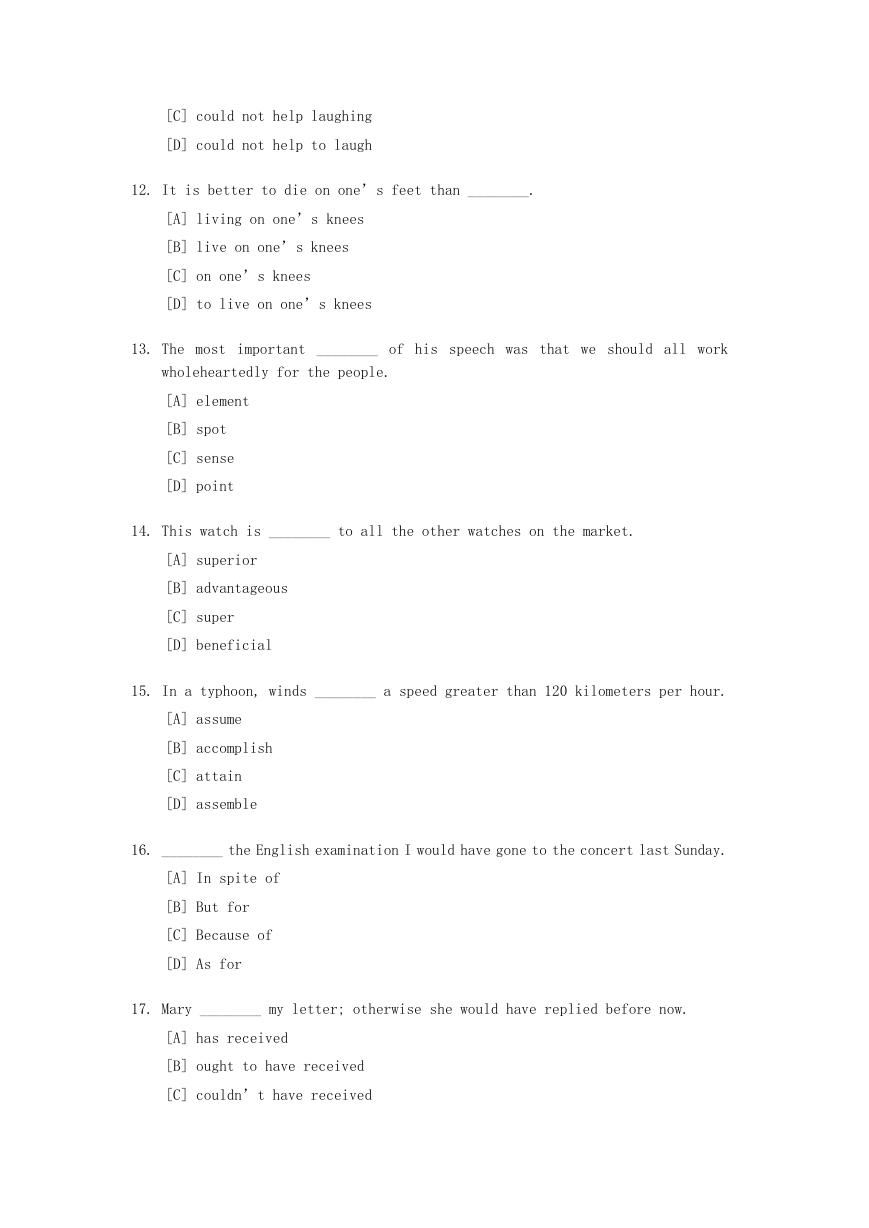


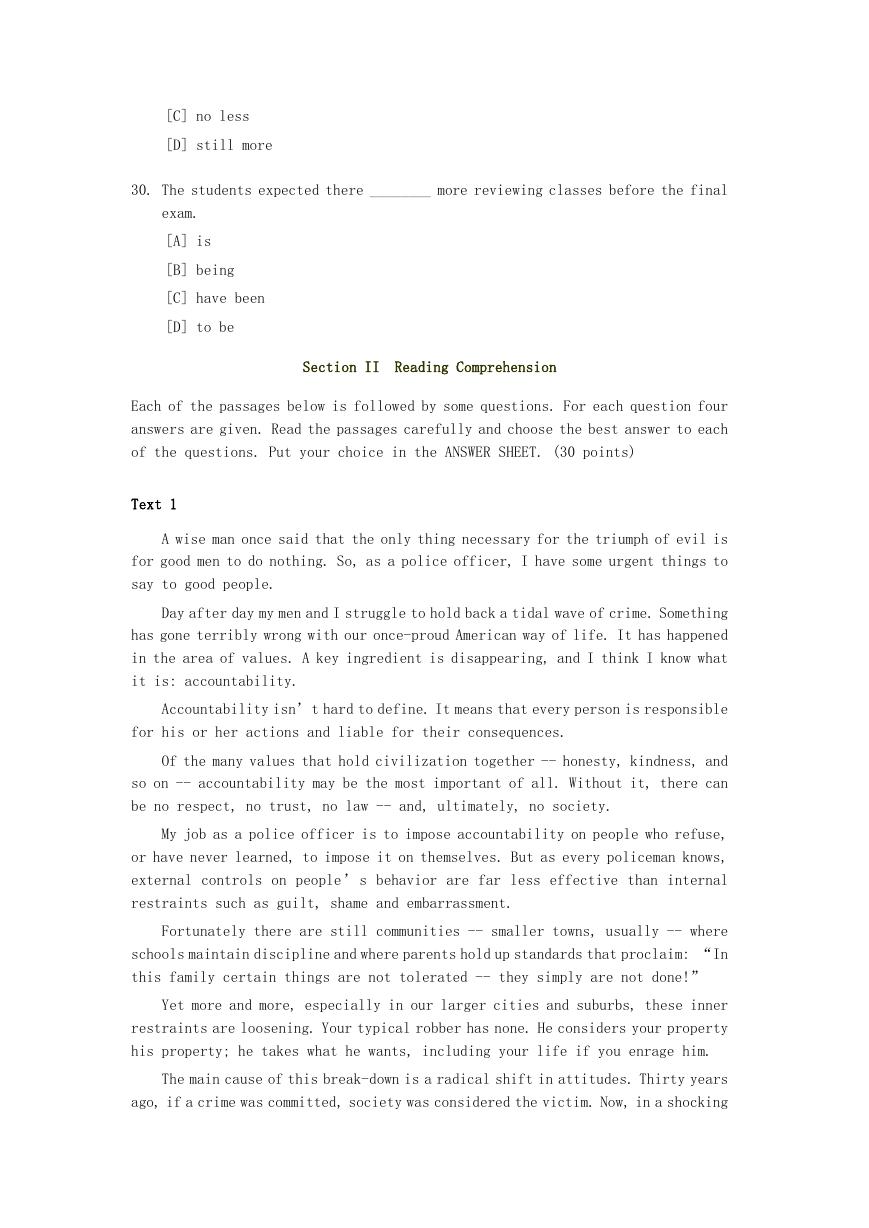
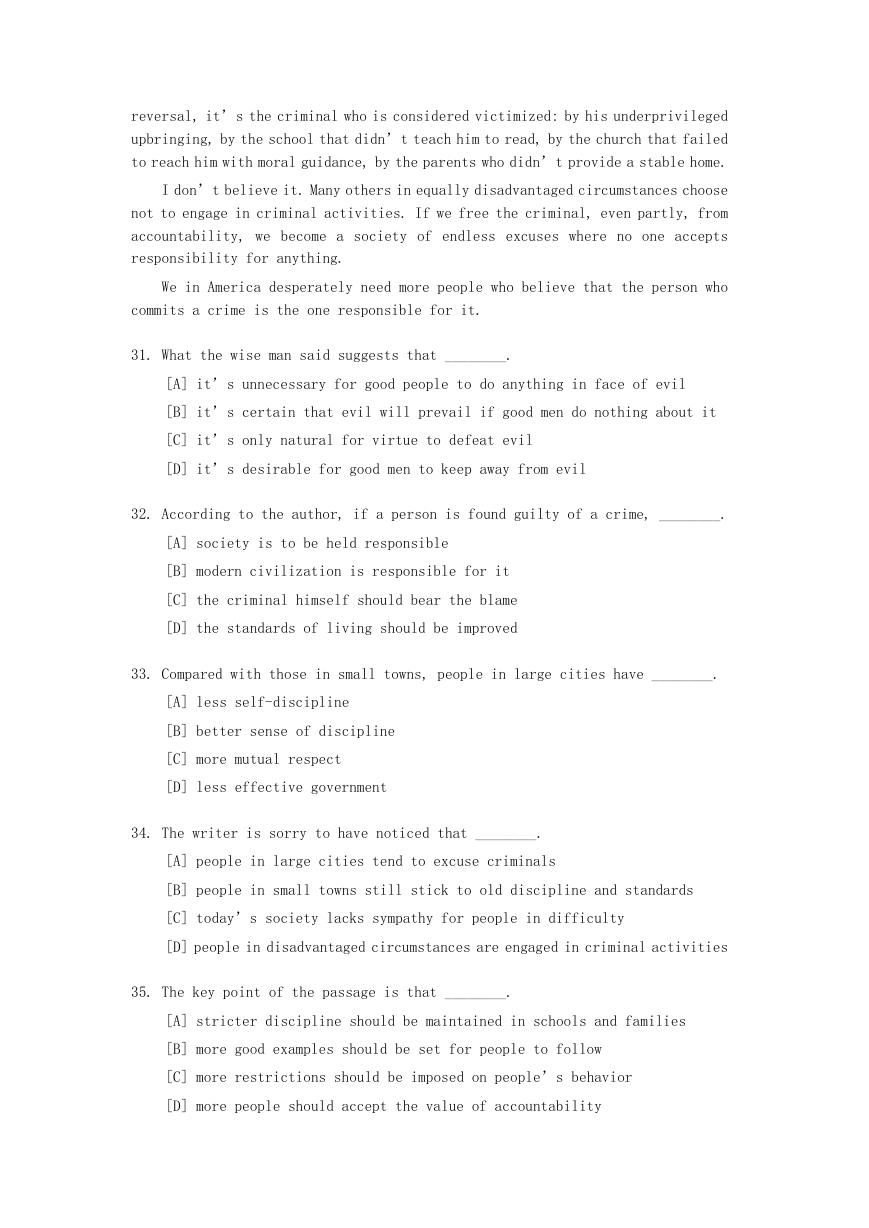
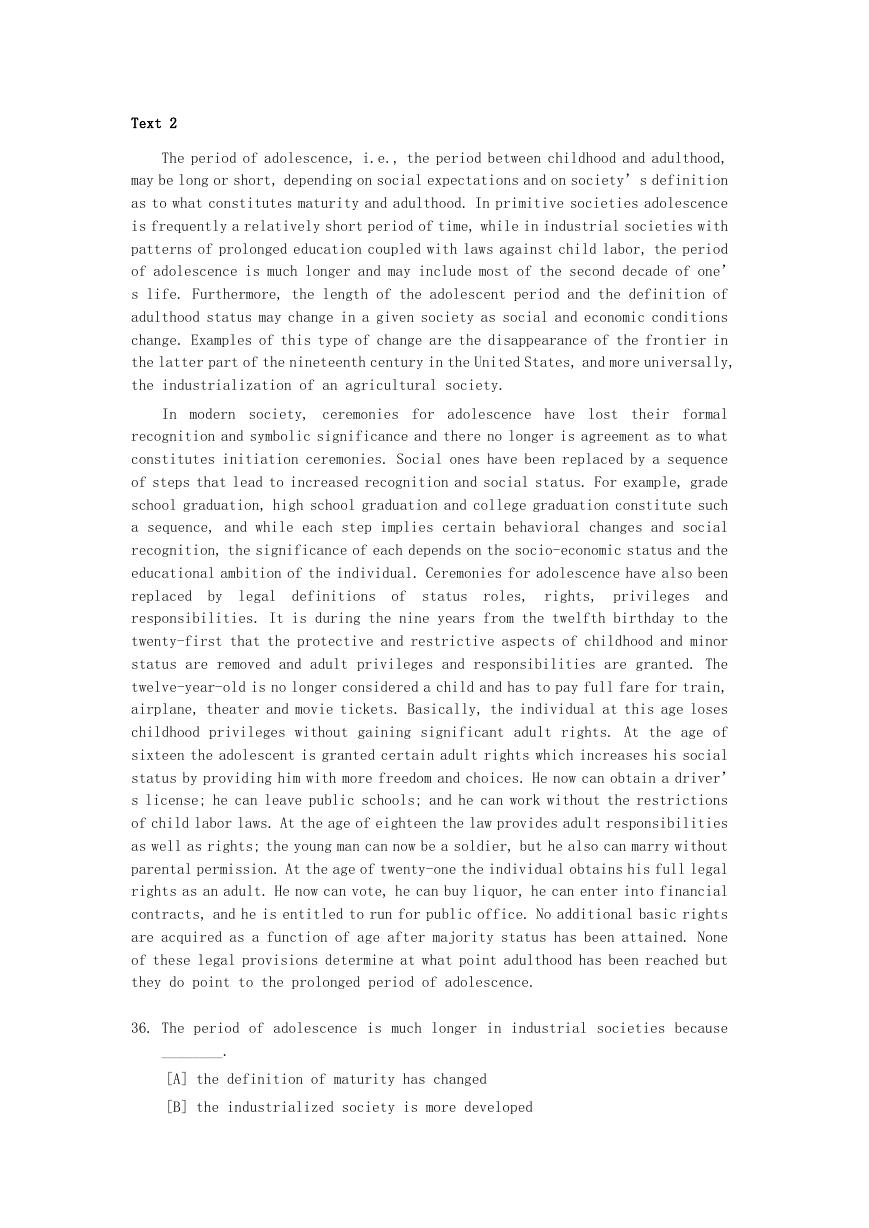








 2023年江西萍乡中考道德与法治真题及答案.doc
2023年江西萍乡中考道德与法治真题及答案.doc 2012年重庆南川中考生物真题及答案.doc
2012年重庆南川中考生物真题及答案.doc 2013年江西师范大学地理学综合及文艺理论基础考研真题.doc
2013年江西师范大学地理学综合及文艺理论基础考研真题.doc 2020年四川甘孜小升初语文真题及答案I卷.doc
2020年四川甘孜小升初语文真题及答案I卷.doc 2020年注册岩土工程师专业基础考试真题及答案.doc
2020年注册岩土工程师专业基础考试真题及答案.doc 2023-2024学年福建省厦门市九年级上学期数学月考试题及答案.doc
2023-2024学年福建省厦门市九年级上学期数学月考试题及答案.doc 2021-2022学年辽宁省沈阳市大东区九年级上学期语文期末试题及答案.doc
2021-2022学年辽宁省沈阳市大东区九年级上学期语文期末试题及答案.doc 2022-2023学年北京东城区初三第一学期物理期末试卷及答案.doc
2022-2023学年北京东城区初三第一学期物理期末试卷及答案.doc 2018上半年江西教师资格初中地理学科知识与教学能力真题及答案.doc
2018上半年江西教师资格初中地理学科知识与教学能力真题及答案.doc 2012年河北国家公务员申论考试真题及答案-省级.doc
2012年河北国家公务员申论考试真题及答案-省级.doc 2020-2021学年江苏省扬州市江都区邵樊片九年级上学期数学第一次质量检测试题及答案.doc
2020-2021学年江苏省扬州市江都区邵樊片九年级上学期数学第一次质量检测试题及答案.doc 2022下半年黑龙江教师资格证中学综合素质真题及答案.doc
2022下半年黑龙江教师资格证中学综合素质真题及答案.doc